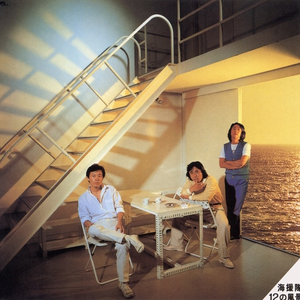俺が信長
海援隊 Lyrics
Jump to: Overall Meaning ↴
死んでそれから 何処へゆくのか
ほらみろ 何にも 判らぬクセに
天から貰うた 命のクセに
返すのを惜んで 泣いて居るのか
一重まぶたの 信長が
光る眼(まなこ)で 雨に打たれて
田楽狭間の戦場(いくさば)駆ける
敵に味方に 叫んで通る
俺が信長 見知り置け
一人で生きるが 辛いからと
悲しみ知らずに 生きてみたいと
仏に縋(すが)って 座って居るのか
地獄におちる 覚悟もせずに
お前に何が 出来るというのか
一重まぶたの 信長が
光る眼(まなこ)に 炎を映し
燃える比叡の寺を眺める
一重まぶたの 信長が
仏を大刀で 切り割って
俺が信長 見知り置け
北は越後の上杉景虎
戦上手の武田が居って
南は牙むく島津の隼人
海から睨むは土佐のやつらか
敵が多いと しみじみ笑う
一重まぶたの 信長が
光る眼(まなこ)に 天を仰いで
この世は夢と 唄って通る
一重まぶたの 信長が
戦仕掛けに 叫んで通る
俺が信長 見知り置け
The lyrics of 海援隊's song 俺が信長 delve into deep reflections on life, death, and the enduring legacy of historical figures like Oda Nobunaga. The opening lines ponder the existential questions of where one was before birth and where one goes after death, juxtaposed with the irony of receiving the gift of life from heaven yet hesitating to return it. There is a sense of questioning the nature of existence and the reluctance to let go of life's fleeting moments, portrayed through the imagery of tears and the enigmatic gaze of Oda Nobunaga's eyes.
The mention of Oda Nobunaga at the battlefield of Nagashino highlights his role as a formidable warrior and leader, characterized by his single eyelid that reflects a steely determination and unwavering resolve in the face of adversity. The lyrics convey his fearless nature as he charges into battle, unafraid to confront both enemies and allies alike, embodying a sense of loyalty and self-assurance that commands respect. This portrayal of Oda Nobunaga as a fearless and solitary figure resonates with the theme of enduring hardships and seeking solace in the midst of life's challenges.
The lyrics further explore Oda Nobunaga's complex persona, depicting a desire to live a life free from sorrow and ignorance, yet grappling with the inevitability of suffering and uncertainty. The imagery of seeking refuge in Buddhism and contemplating the consequences of one's actions alludes to a deeper sense of introspection and spiritual contemplation. Oda Nobunaga's gaze, reflecting flames and destruction, symbolizes a fierce determination to challenge conventions and carve a path through adversity, unafraid to confront the trials and tribulations of existence.
The references to other historical figures such as Uesugi Kenshin, Takeda Shingen, Shimazu Yoshihiro, and the people of Tosa reflect a broader context of political turmoil and territorial conflicts during the Sengoku period. Oda Nobunaga's unwavering gaze towards the sky and his proclamation of this world being a dream underline a sense of transience and impermanence, suggesting a stoic acceptance of life's imperfections and the inevitability of change. As the lyrics culminate in Oda Nobunaga's declaration of identity and purpose, the song encapsulates themes of resilience, determination, and the enduring legacy of historical figures who shape the course of history.
Lyrics © O/B/O APRA AMCOS
Written by: 鉄矢 武田
Lyrics Licensed & Provided by LyricFind

大根役者
まだ30代だった時に、この詩を書いた武田鉄矢さんあなたは偉い‼️👍💪👌✌️😄
岩田鉄五郎
これぁ、いい唄だね。TVドラマと映画は散々だったけど、『お~い竜馬』の原点にして、海援隊の『Let It Be』だと思うな。
須藤正啓
ホンマやな。
S.A
今の日本に、こんな人出てこんかなぁ~
松村正
いいな。
寿司太郎
武田鉄矢の龍馬は身長低いし。実物は173センチくらいだったんでしょ?